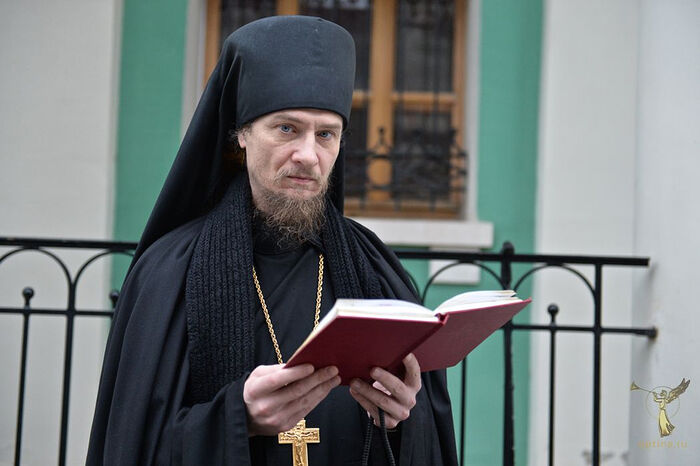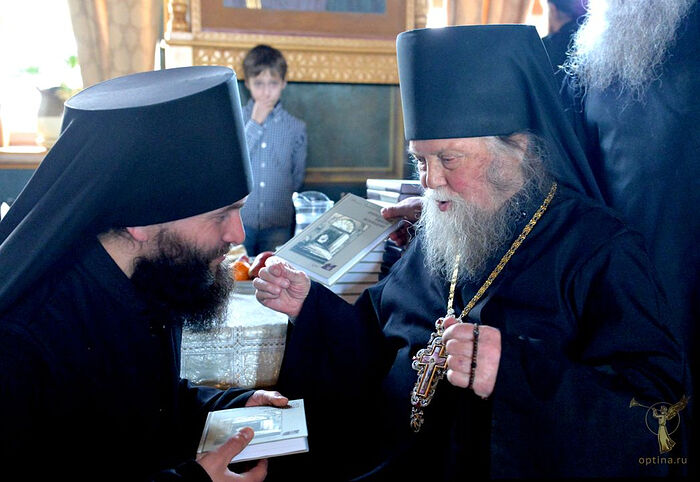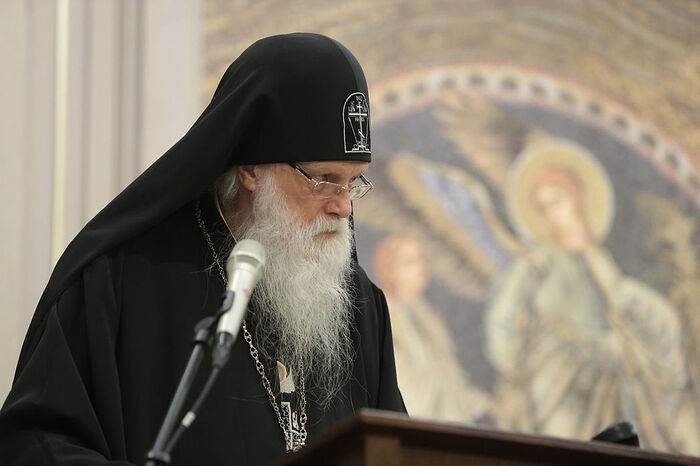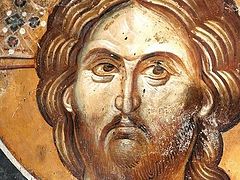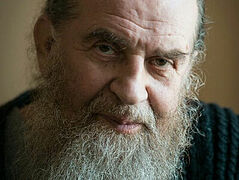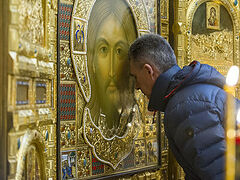The question of the existence of elders in our days as possessors of a special spiritual experience remains relevant and occupies people’s minds, who sometimes invest it with a very different meaning , according to their own ideas and expectations. You can often find contradicting attitudes to this question among monastics too. The Russian Church’s Synodal Department for Monasteries and Monasticism spoke about the traditions of eldership and elders with Hieromonk Isaac, a resident of Optina Monastery, dedicated to the Entrance of the Theotokos into the Temple.
—Fr. Isaac, what is eldership, and are there elders today, in your view?
—Eldership, as I see it, implies two aspects. The first is the presence of special people endowed with the gift of clairvoyance. There were such people even in Old Testament times—the Prophets. From the Bible we know that, having heard the call of God, they devoted themselves to the Lord. They devoted all their strength to this ministry, and the result of such desire for the Divine was that they renounced all things earthly, worldly, and thereby became possessors of extraordinary spiritual gifts. We also know from Old Testament history that they could foretell the future, proclaiming the coming of the Messiah—Jesus Christ—and they worked miracles and healings. Their entire lives were dedicated to spreading faith in God among the ancient Israelites. Mankind was in a state of idolatry then. Faith in the one God was barely flickering only among the Israelites, but they too, unfortunately, under the influence of their pagan surroundings, often departed from it and erected idols, and sometimes it even got to the point of human sacrifice. We know, for example, that there was a valley next to Jerusalem, called the “Gehenna of fire,” where sacrifices were offered to idols.
Inasmuch as they knew God, the Prophets spoke with Him and spread this knowledge, and largely thanks to them, knowledge of God was preserved until the time of the coming of Christ. And it’s also important that there was continuity among the Prophets, and there were even prophetic schools. They’re mentioned in the books of the Old Testament as “companies of prophets” and “sons of prophets.” In the narratives of the lives of the Prophets, we see how they gained disciples by the inspiring example of their holy lives and the power of their spirits, their teachings, and their miracles. So, for example, it’s known that the Prophet Elisha was a disciple of the Prophet Elias. In other words, it was what we now called eldership. The disciples received this ministry from their teachers, and over time became themselves prophets.
And here the second aspect of eldership manifests itself as a special path of the spiritual life, when a man completely entrusts his will to a spiritual guide.
Elder Barsanuphius of Optina said that monasticism, the spiritual life, is the science of sciences and the art of arts, which must be studied. Just as any science or any art should be taught by an experienced mentor, so the spiritual life involves learning from someone who can show the correct path and send his disciple along this path. That is, the presence of people inspired by the Divine Law and faith, and the transfer of experience, of spiritual gifts from teacher to student are the two aspects of eldership necessary to maintain the spiritual tradition.
As for the second part of the question, when Optina abbot Archimandrite Benedict (Penkov) was asked during a spiritual talk at the monastery whether there are elders today, he replied: “First of all, we have to ask if there are novices today.” Indeed, for there to be elders, there have to be novices, at least because, firstly, the elder himself grows out of a novice, and secondly, if there are no novices, then the question is, do we need elders? St. Ignatius (Brianchaninov) said that in the last times, elders will be hidden under cover of humility. And in this sense, it does turn out that today there is no, or very little demand for true eldership. After all, people prefer to be guided by their own opinions and live according to their own will.
—Returning to the words of Fr. Benedict, I would like to ask why, do you think, it’s become so hard for people to listen and obey?
Vladyka Theognost (the Archbishop of Kashira and head of the Synodal Department for Monasteries and Monasticsm—Ed.) came to visit us at Optina once. He told us about how one very well-known Greek bishop, a theologian, was invited after presenting at a conference at the Holy Trinity-St. Sergius Lavra to meet with the students of the Moscow Theological Academy and the brethren of the Lavra. During the talk, one monk asked the visiting bishop to name the most important theological problem of modern Greece, and he answered that the biggest problem is egotism. This is what really characterizes modern man.
Elder Ambrose said: “Why is a person bad? Because he forgets that God is above him.” In other words, when man’s connection with God is severed, he “is bad.” And that says it all. Man is created in the image and likeness of God. It’s intrinsic to him, and he’s designed to be in constant dialogue with his Creator.
And the question isn’t whether there’s an elder in the monastery or not, but whether people have a desire for the spiritual life. The tradition can be restored if there is such a desire. The Lord says in Revelation: I would thou wert cold or hot. So then because thou art lukewarm, and neither cold nor hot, I will spue thee out of My mouth (Rev. 3:15-16). Commentators say this precisely is a characteristic feature of the Christians of the last times: Neither cold nor hot—the lack of determination, the lack of an all-consuming desire for the spiritual life as life with God.
Even if some tradition is interrupted for a time,
the Church of Christ’s connection with God is never interrupted
—And yet, obedience to a guide is crucial for spiritual development, isn’t it?
—It seems to me that an elder can significantly speed up the process of his disciple’s spiritual growth. The Lord said: But be not ye called Rabbi: for one is your Master, even Christ… And call no man your father upon the earth: for one is your Father, Which is in Heaven. Neither be ye called masters: for one is your Master, even Christ (Mt. 23:8). After all, the Church is not just an organization with certain rules—it is, first of all, a living organism, and communion with God in the Church is also living. And even if some tradition is interrupted for a time, the Church of Christ’s connection with God is never interrupted. I will build My Church, says the Lord, and the gates of hell shall not prevail against it (Mt. 16:18). Even if there are no spiritual teachers left, the living connection of every member of the Church with God won’t allow the tradition to be interrupted.
The Lord, participating in the Mystery, removes all the oppressive weight of doubts and worries from the soul of man, and in this regard, the revelation of thoughts, which we haven’t spoken about yet, was always another important component of eldership. This is also an effective way to find answers to your questions in the spirit of truth, to learn to seek and understand it. In the skete at Optina, the brothers would even go twice a day, morning and evening, to reveal their thoughts to the elder.
Once Optina abbot Archimandrite Isaac was asked: “Batiushka, you’re the abbot of the monastery, a cleric, you have so many monks in your care, and you still go to the elder for Confession. What for? What do you have to repent of? What sins could you have?” To which the abbot responded: “Leave this table for a week in a room with closed windows and a locked door. Then come and run your finger along it. And there will be a clean strip on the table, and on your finger—dust, which you don’t even notice when it’s in the air. It’s the same with sins: Big or small, they’re accumulating all the time. And they must be cleansed by repentance and Confession. This is what brings a man near to God. Our souls are made to be the bride of Christ. Let us recall the parable of the ten virgins. The soul is likened to a bride who must preserve her purity for marriage with the Heavenly Bridegroom, otherwise she will be like the foolish virgins, who didn’t keep their lamps burning (cf. Mt. 25:1). As St. Seraphim of Sarov said, although they had some virtues, they didn’t feel the need to acquire the Holy Spirit. Apparently, they were striving for something else. They had other values.
However, this isn’t enough. Man is called to preserve his purity and in purity to dedicate himself to God. Only the wise virgins who preserved it were accounted worthy to enter into the Heavenly Bridal Chamber. Confession and the revelation of thoughts help us acquire purity of soul. After all, throughout his life, one way or another, man departs from God, losing his purity and loyalty to Him. Any alien thought, not to mention actions or words, leaves a kind of stain on the soul. But to enter the wedding chamber of the Heavenly Bridegroom, to end up in the Kingdom of Heaven, one must truly be worthy of it; the soul must be immaculate, faithful.
—I have heard from some abbots and abbesses at monastic forums that they don’t have enough spiritual experience to hear revelations of thoughts. What should the inhabitants of the monastery do in this case, if there’s no one to reveal their thoughts to?
—Confession is a Sacrament established by the Lord. In certain external forms, the grace of God acts invisibly through visible acts perceptible to human perception. He who is truly repentant, with the visible expression of forgiveness from the priest, is invisibly released from sins by Jesus Christ Himself. With this, the penitent is reconciled with God, the Church, and his own conscience. And here, for the efficacy of this Sacrament, it’s important to sincerely repent of what you have done, to have contrition for your sins and a firm intention to amend your life. All of this happens regardless of the spiritual experience of the one hearing the confession. After all, in the words of St. Ignatius, regular confession of sins and revelation of thoughts is the best means for purifying the soul in the unseen warfare with the passions and vices.
Moreover, every sin begins with thoughts. The Holy Fathers describe the stages of the capture of the soul by a sinful passion. It all starts with one thought, which is called a “suggestion.” This isn’t just a sinful thought, but an image, feeling, desire, or state that suddenly arises in the human soul. It’s impossible to completely avoid this, but it’s within man’s power to accept or reject it. The next stage in the strengthening of a passion is “interaction,” that is, a conversation with the thought, which attracts attention. There arises the danger of being captivated by the sin, of inclining towards the sinful thought and moving on to the next stage—“consent.” Here is the full acceptance of the passionate thought, which captivates and fills the mind, feelings, and will, so that the sin begins to act in the human soul and prepares it to commit sin in deed. Lingering in this state leads to “captivity,” when even the desire to abandon the sinful thought disappears, and man is no longer able to get rid of the vicious desire that has taken possession of him. The final stage is the activated passion, which paralyzes the will and leads a man to sin. And if a man allows the regular repetition of the passionate movements of the soul within himself, then he falls under the power of the vice more and more. Therefore, it is the revelation of all such moments to the confessor, the illumination of the heart by the light of grace that liberates us from the darkness of our own wicked thoughts, desires, and vain reasonings.
Confession and the revelation of thoughts help everyone cleanse their souls, leaving not a single dark spot on them. The very structure of Church life is organized so that man participates in the Sacrament of Confession, and even more so that he doesn’t neglect it in the turmoil of thoughts and feelings—which, of course, happens from time to time in cenobitic monasteries when people interact with one another.
There’s an image in the Patericon: Monks in a monastery are like rocks in a bag that grind their rough corners against one another and become smooth. Such is our life in the monastery—to acquire spiritual smoothness, we need Confession and revelation of thoughts. It helps us not plunge into gloomy thoughts and makes the interactions between brothers (or sisters) in a monastery grace-filled and salvific.
The monastic life presupposes the presence of a spiritual guide
—Many remember the statement of Archimandrite Gabriel (Bunge) about how the closure of monasteries in our country didn’t mean the end of monasticism, because even in the years of official atheism, the tradition of eldership was preserved, thanks to which monasticism was also preserved. There are Church scholars who say that in eighteenth-century Russia, monasticism, which had practically disappeared at the time, was revived thanks to St. Paisius (Velichkovsky), from whom Optina eldership takes its beginning. Can we say that as long as there’s spiritual guidance, monasticism will also live, and vice versa?
—The monastic life presupposes the presence of a spiritual guide. Maybe he won’t be so great and holy or so experienced as the Optina Elders but nevertheless, it’s precisely spiritual guidance, the fact that a man entrusts his will to a confessor that is the basis of spiritual work. One of the ancient Fathers, I think St. Poemen the Great, talks about this: “Our will is a brass wall between man and God.” And indeed, the Lord turns to all, wants salvation for all: Behold, I stand at the door, and knock: if any man hear My voice, and open the door, I will come in to him, and will sup with him, and he with Me (Rev. 3:20). But often, for some reason people aren’t so willing to open the doors of their hearts to Christ. Probably because the voice of their own will drowns out the Divine call. Man sometimes simply doesn’t hear it. Or perhaps he hears it but doesn’t perceive it.
What do we need to do? Just come and take what the Lord offers: Taste and see that the Lord is good (Ps. 33:9). But for some reason, after the fall, after man lost his direct contact with God, there aren’t so many who want to do this. When we begin to cut off our own will and follow the spiritual advice of a guide, we break down the “brass wall” between ourselves and God and find the opportunity to hear His voice, to perceive His call.
Do you remember the Old Testament story of the Prophet Samuel? The holy and righteous Anna was barren and implored the High Priest Eli to pray for her. When Anna bore a son by his prayers, she gave him to the service of God (1 Kg./1 Sam. 1:28). The boy Samuel lived in the house of the High Priest, and several times at night he heard a voice calling him: “Samuel, Samuel.” He ran to the High Priest, thinking it was he who was calling him. But the elder realized that it was the Lord calling Samuel, and told him what to do: Thou shalt say, Speak, Lord; for thy servant heareth (1 Kg./1 Sam. 3:9). This is a story about how an inexperienced person doesn’t understand whether it’s a Divine voice calling him, he doesn’t know how to reply, and maybe doesn’t even hear it. The experienced man can distinguish the phenomena of the spiritual world; he is endowed with the gift of discernment and can guide a novice on the correct path.
There’s a famous story when one monk, whose spiritual father was St. Ambrose of Optina, told the Elder: “Batiushka, you know, I don’t see any special spiritual gifts in you. I only see that you have the gift of discernment.” To which the Elder replied: “Well, okay, at least it’s something,” and then he dismissed him. Time passed, and this monk read a story in the Patericon about how some experienced elders gathered and started discussing which of the virtues is the most significant for the spiritual life. One talked about prayer, another about fasting, another about abstinence. Having consulted with one another, they came to the conclusion that the most important virtue is that of spiritual discernment. And the monk realized that what he was accusing his elder of was actually the highest spiritual peak a man can reach. After all, only a very experienced ascetic can distinguish the source of every internal movement of thought or feeling—whether it’s from God or not. It’s with this gift of reasoning that he can protect his disciple from falling into prelest, and in general from evil and even deadly intentions, actions, and decisions.
To be continued…

